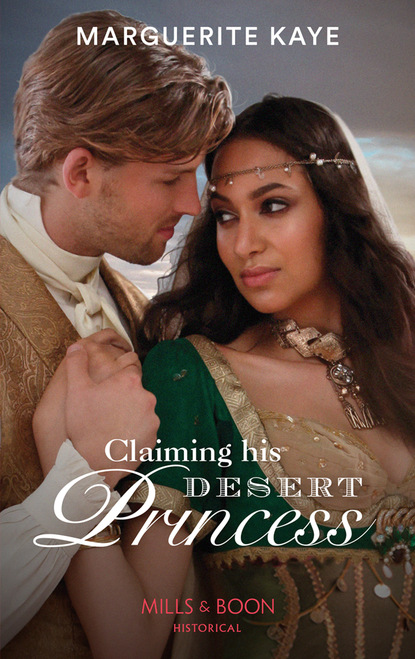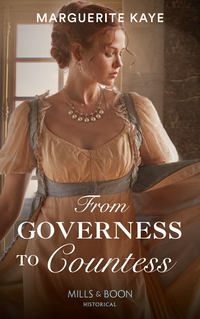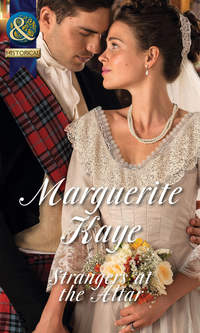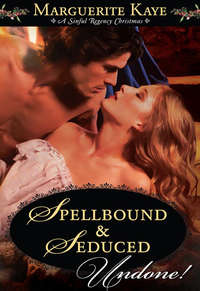
Полная версия
Sheikh's Mail-Order Bride
A man stood at the far end of the salon gazing out of a row of tall windows into the darkness beyond. He was dressed from head to toe in white silk robes, his cloak woven with golden threads. Diamonds glittered in the band which held his headdress in place. He was both tall and lean, yet she had the distinct impression of a latent strength in the broad set of his shoulders.
‘Lady Constance Montgomery,’ the official announced in his thick accent, giving her a little push. ‘His Most Royal Highness, Prince Kadar of Murimon.’
The heavy wooden doors closed behind her with a resounding thud, the Prince turned around, and Constance’s heart skipped a beat, her mouth went dry, and the muscles in her belly clenched in a visceral surge of desire that took her entirely by surprise.
He was young, no more than thirty. His brow was high, his face long, his nose strong. Austere features, not handsome in the conventional sense, actually slightly forbidding, framed as they were by his headdress. Definitely not a man who needed his regal robes to underline his natural air of authority. It was evident in his demeanour, in that haughty expression, and in those remarkable eyes, which were almond-shaped and wide-set, a curious colour which was neither grey nor green. Like all the men in this land, he wore a beard, but his was trimmed very close, not much more than a dark shadow, drawing attention to the contrasting smoothness of his cheekbones, the disturbingly sensual curve of his mouth. Beneath her rustic tunic, Constance felt her skin flush as heat suffused her. Those lips were sinful.
‘Lady Constance.’
With a start, she dropped into a low, sweeping curtsy. She had been staring at the Prince like a ravening wolf. Her eyes lowered, she had the sense of a lithe grace as he crossed the room towards her, his feet clad in black slippers embroidered with gold, his robes fluttering around the long length of his legs. Dear heavens, she should not be looking at his legs. She raised her eyes. Slim hips. She oughtn’t to look at those either. A belt slung around his narrow waist, chased with gold and at the centre, an enormous jewel glowed red and luminous, like a diamond lit by fire.
‘Please, rise.’
His voice was husky. It made the hairs on the back of her neck stand on end. For goodness’ sake, Constance, pull yourself together! The hand he extended was slim, the long fingers artistic, the nails neatly trimmed. His skin was cool to the touch. Mortified, she realised her own palms were clammy, her skin most likely ruined beyond recognition by a combination of salt and sun. Which all paled into insignificance when compared to her windswept hair, which most likely looked as if it had birds nesting in it, her sack-like gown and her grubby bare feet. She felt like Cendrillon in Monsieur Perrault’s story. It was a shame this prince had no slippers to offer her. She curled her toes further under her tunic.
‘Your Highness, it is an honour,’ Constance said.
‘In the circumstances, I am not sure that “welcome” is the most appropriate epithet to use to describe your somewhat unconventional arrival in Murimon, but I hope you will allow me to welcome you to my kingdom nonetheless.’
Surprise made her forget protocol. ‘Oh, you speak English beautifully.’
‘Thank you. My childhood tutor would be most gratified to hear that.’
Colour flooded her cheeks, for his words were lightly ironic. ‘I did not mean to imply astonishment that you can speak my language, only delight. It is a pleasure, Your Highness, to make your acquaintance.’
‘I fear that sentiment may alter when you hear what I have to say. Please, won’t you sit down?’
The chamber was even bigger than she had realised when she first entered it. Now that her eyes had grown accustomed to the blaze of light cast by the extraordinary chandeliers, Constance could see it was almost the same proportions as the tea room in the Bath Assembly Halls, with the same style of double-columned balcony on the side opposite the windows. But there the similarities ended. Every available wall surface in this salon was tiled, row after row of rich gold and earth colours, separated by elaborately carved rococo dados. On the furthest wall was something which looked rather like a four-poster bed, and which Constance assumed must be the royal throne. Though the floor immediately in front of it was covered in thick silk rugs, there was, however, not a single other seat, cushion or chair to be found.
Prince Kadar seemed to realise this at the same time as Constance did. ‘I’m sorry,’ he said ruefully, ‘the Royal Saloon is designed to intimidate visitors, not offer them comfort. I had forgotten.’
‘Forgotten?’
‘I have used this room but once before. When I took my vows.’
‘Your vows,’ Constance repeated, wondering if she was being obtuse. ‘Ah, I see now. This room is used for royal weddings?’
‘I am not married.’ A flicker of something—pain? Sorrow? Regret?—passed over the Prince’s countenance, but it was gone so quickly Constance might well have imagined it. ‘The solemn vows I took when I assumed the crown,’ he said.
‘Oh, you mean your coronation.’
Another shake of the head. ‘No, that ceremony was postponed until after the period of national mourning for my elder brother, who died suddenly three months ago.’
‘I am so sorry, how dreadful. My most sincere condolences.’
She had reached out to touch him in an automatic gesture of sympathy. The Prince was staring at her grubby, tanned hand with its ragged nails, which contrasted starkly with the pristine sleeve of his tunic, as if fascinated. Or more likely repelled. Or simply appalled at her lack of deference. Constance snatched her hand away. ‘Were you close, you and your brother?’
He took so long to answer she wondered if he had heard her question. Or perhaps posing it had been another breach of protocol. When he finally spoke, his tone was flat. ‘I have been living abroad for the last seven years.’
Which was no answer, but his frosty expression made it clear the subject was closed. When he turned his back, Constance began to panic. She had offended him. The audience was over before it had begun, and she knew not a single fact more than when she had arrived. ‘Please, Your Highness, if you could...’
He held his hand out to silence her. ‘One moment.’ The throne or divan or whatever it was, was covered in scarlet cushions tasselled with gold. Prince Kadar began to strew them on the floor. ‘There,’ he said, when the throne lay bare and the floor contained two heaps of cushions, ‘now we may both be seated in comfort.’
He sank down with a fluidity she could not dream of imitating, crossing his legs with enviable ease, indicating that she sit opposite him. Considerably impeded by her voluminous tunic, Constance did as he bid her. The Prince tugged off his headdress, casting it carelessly, with its diamond-encrusted band, onto the stripped throne. His hair was black, silky, dishevelled, curling down over the collar of his tunic at the back, the contrast with his austere countenance adding another dimension to his allure. He really was a very, very attractive man.
‘You were saying?’
Constance started. ‘What?’ She blushed. ‘I mean, I beg your pardon.’ She pushed her wild tangle of hair away from her face. ‘I mean, yes, I was. I was wondering—that is—the other passengers on the Kent, the crew, Captain Cobb.’
‘Of course.’
Prince Kadar rested his chin on his steepled fingers. His eyes really were an extraordinary colour, like stone speckled with lichen. What was he thinking? She shifted uncomfortably on the cushions. She wished he would say something. ‘Your Highness? I cannot be the only survivor, surely?’
‘No. No, of course not.’ Another pause. ‘You are anxious. Forgive me, the situation is somewhat awkward, I was trying to think how best to explain it.’
‘I much prefer the unvarnished truth. I find it is less painful in the long run.’
This remark earned her another of those looks. Assessing, that was the word she had been searching for. ‘You speak as one who has experience of—er—painful truths?’
‘That’s not what I said.’
‘It is what you implied.’
‘Goodness,’ Constance retorted, ‘am I on trial?’
Prince Kadar flinched. Then he smiled ruefully. ‘I beg your pardon, of course not. I find you—interesting.’
Which was no compliment, she was sure, but she was blushing all the same. ‘Well,’ Constance said, flustered, ‘I find you interesting too.’ Could she find anything more fatuous to say! ‘I mean, I have never met a prince before.’ Or inane! ‘You were right.’ Deflated, she smiled at him awkwardly. ‘I have had a great deal of experience in painful truths of late, but if you are thinking that I am likely to dissolve into hysterics at whatever it is you have to tell me, then let me reassure you, I am not the hysterical type.’
‘After what you have been through, I am surprised that you have any equanimity at all,’ the Prince replied. ‘Your composure is admirable.’
‘Oh, it’s not. Trust me, beneath this stylish piece of clothing, which is the only one I possess, I am shaking like a jelly.’
The faintest trace of colour stained his cheeks in response to this remark. His gaze was fixed on the gaping neck of her tunic. She had embarrassed him. And now she had embarrassed herself again. Constance bit back her apology, realizing just in time that it would only make matters worse, deciding to take a leaf out of the Prince’s book, and hold her tongue. And stop fidgeting. And stop staring.
‘The sinking of the Kent,’ Prince Kadar pronounced finally, as if he were reading from Shakespeare. ‘First of all, I must apologise. I was out of the country on state business when the ship went down, and since my return I have been required to devote my time to dealing with the consequences of the shipwreck. I am afraid the message sent to the palace informing us of your survival was overlooked until yesterday. Be assured that I acted upon it immediately.’
‘The man you sent was certainly efficient,’ Constance replied, ‘though I confess I found the sea journey somewhat more of an ordeal than I anticipated. I fear I can no longer claim to be such an excellent sailor as I once was.’
‘I am sorry. It did not occur to me that another sea voyage so soon after your ordeal would be a fraught experience for you. I thought only to have you brought here by the fastest route possible.’
‘Please, think nothing of it.’ Constance repressed a shudder. ‘My only regret is that my expression of thanks to Bashir, the village elder whose family cared for me, were woefully inadequate.’
‘You need not fret about that. I instructed my Chief Adviser to ensure that the village was rewarded for the care which they took of you. I am sure that Abdul-Majid said and did everything that was appropriate. He is a most—a most conscientious servant of the crown.’
Though not a servant close to Prince Kadar’s heart, if she did not mistake that tiny little moue of distaste. ‘A Chief Adviser,’ Constance said, ‘implies that you have many others.’
‘A great many, all most anxious to air their opinions, none of which, I am fairly certain, coincide with mine.’
The words were spoken with some feeling. The Prince looked as if he would prefer them unsaid. Tempted as she was—very tempted—to pursue the matter, Constance decided not to risk a further retreat into that haughty shell of his. Her fingers strayed to her wound, which was beginning to throb.
‘Does it pain you? Will I call a physician? Has the journey exhausted you? Would you prefer to postpone this discussion until you are rested?’
‘No.’ She smiled reassuringly, for the Prince looked genuinely concerned. ‘No and no.’ Constance sat up, wrapping her arms around her knees as butterflies started up in her stomach again. ‘Please continue.’
‘Very well,’ he said brusquely. ‘First of all, I should inform you most regretfully that there were fatalities. Twenty-seven—twenty-six, now that we know you are not one of them, a small percentage from a ship’s complement of six hundred. The captain managed to steer close enough to our waters for our fishing dhows to rescue the vast majority of people on board, and to recover the bodies of all those unfortunate souls who perished. You are the only one who seems to have been swept so far from our main port. The piece of broken mast you were found clinging to in all likelihood saved your life.’
‘Is Captain Cobb among the survivors?’
‘Yes, it is from him that we gained some basic knowledge of you. Your name, your place of embarkation, your destination, and your companion for the journey. I am afraid, Lady Constance, that she was one of the souls who perished. Please accept my condolences for your loss.’
‘Oh, dear. Excuse me.’ Constance dabbed at her eyes with the sleeve of her tunic. ‘Mrs Peacock was returning to India to rejoin her husband after an extended visit with her family in England. Poor woman.’
‘We had assumed she was a relative.’
‘No, I met her only the day before we boarded, but I am truly sorry to hear that she has perished. My father paid her to play companion to me. We shared a cabin. It would not have been proper for me to have travelled alone.’
‘Your father is in England, then, and not in Bombay?’
‘Both my parents are in England. Why do you ask?’
Prince Kadar looked grave. ‘A full report of the fate of the Kent, its cargo, its passengers and crew, and the numerous steps my kingdom has taken to provide assistance, has already been sent to your Consul General in Cairo. I am not sure how long it will be before that report arrives in England, but I fear it will be before we can have an addendum sent.’
‘Addendum?’
‘Lady Constance, in my report you are listed as missing, presumed dead. Yours was the only body from the ship’s complement unaccounted for. As time passed it became ever more certain that you had perished, unfortunately.’
Constance stared at him in dismay. ‘You mean my mother will be informed that I have drowned?’
‘I am afraid so. And so too will whoever was to receive you in Bombay when Captain Cobb arrives to break the news.’
‘Captain Cobb? Arriving in Bombay? But...’ Her head was beginning to reel. ‘I’m sorry, I don’t understand.’
‘We were most fortuitously able to provide the captain with a replacement ship. He was most anxious to reach his destination, and since all hope of finding you alive had been abandoned, there was no reason for them to delay their journey further. They set sail almost a week ago.’
‘A week! A whole week! Then there is no chance of my joining them?’
‘No chance whatsoever,’ the Prince replied with an air of finality. ‘May I ask, Lady Constance, why you were aboard the Kent? These East India ships have a very high attrition rate. Your parents must have been aware of the risks when they made arrangements for you to sail east.’
‘They were assured that I was in safe hands, since Captain Cobb enjoys an excellent reputation as one of the finest captains in the entire fleet and—and it seems it was deserved, for to only lose twenty-six lives from six hundred, when it could have been so much worse, is admirable seamanship.’
‘Assured by whom?’
‘The man who arranged my journey, who as a major shareholder is therefore extremely well versed in such matters.’
‘Ah, you mean this man is a merchant of the East India Company?’
‘Yes. Mr Gilmour Edgbaston.’
‘A relative?’
‘Not as such. Mr Edgbaston and I are— We are— The fact of the matter is that I was on my way to India to marry Mr Edgbaston,’ Constance said faintly. ‘And now when Captain Cobb arrives he will have the sad task of informing my future husband that his bride has drowned at sea.’ She swallowed a bubble of hysterical laughter. ‘You can have no idea, Your Highness, how convenient that would be if it were true.’
* * *
Having absolutely no idea at all what to make of this last remark, Kadar studied the Englishwoman in some consternation. When he had first spotted it on the list of those who had perished, Lady Constance Montgomery’s name had conjured up an image of a very proper middle-aged matron. He could not have been more wrong. The rough peasant’s tunic she wore was far too big for her slim figure. Her hair, a deep glossy brown, tumbled down over her shoulders in wild waves. There was a roundness to her cheeks, a fullness to her lips quite at odds with the rather fierce brows. Her brown eyes were wide-spaced, fringed with thick lashes. Her gaze was direct and intelligent, a striking contrast to the vulnerability of her softer features and one which Kadar found unexpectedly—and most inappropriately—beguiling.
‘You cannot mean that you wish yourself dead,’ he said, wondering if the raw pink scar on her forehead had deranged her mind.
She shook her head slowly. ‘No, no, of course I don’t mean that literally only—oh, I don’t suppose you will understand. Being a prince, I expect you are accustomed to arranging your life exactly as you wish it, but...’
‘You are mistaken,’ Kadar answered with some feeling. ‘I had a great deal more freedom when I was not a prince.’
‘Oh?’
Her gaze was curious. He was oddly tempted to explain himself, which was of course ridiculous. Instead, he found himself contemplating Lady Constance’s feet. They looked vulnerable, her dainty little toes peeping out from her tunic. But he should not be looking at her toes, dainty or otherwise. ‘You were telling me why you wished yourself dead.’
‘I was telling you that I don’t truly wish that. Only that I wish— Oh, it sounds silly now. I wish I could have remained undiscovered. Missing presumed free, so to speak.’ She gave a wry little shrug. ‘My marriage was arranged by my parents. I’ve never met Mr Edgbaston, and know very little about him at all, save his name, age and circumstances. When I left England, I thought I had resigned myself to making the best of the situation but I’ve had the whole sea voyage to—to reconsider.’
‘And while you were—what did you call it?—undiscovered you could pretend that it would never happen, is that it?’
Lady Constance nodded. ‘As I said, it was silly of me, but...’
‘But understandable,’ Kadar said, with feeling. ‘Bad enough that you are being forced into a marriage to a man you have never met, but to have to travel halfway across the world, to leave behind all your friends, all your family, your most intimate acquaintance a woman you met for the first time on the day you boarded the ship, it is outrageous.’
‘When you put it like that, I rather think I would be better off dead.’
‘I apologise, I did not mean to upset you. It is merely that I—’ Kadar broke off, shaking his head. ‘My words were quite out of turn,’ he said stiffly. ‘I have no right at all to comment on your personal situation.’
None! And no right to express his own feelings on the matter. He was a prince. How many times must he remind himself of that fact? It did not matter what brought Lady Constance Montgomery here. He had more than enough troubles of his own without becoming embroiled in what amounted to a family matter, no matter how much sympathy he felt for this woman with her clear gaze and her wry smile, the wild curl of her hair trailing down her back over that peasant’s tunic, and her bare little toes. Now was not the time to be distracted by any of these completely irrelevant attributes, nor to delve further into the precise nature of her betrothal. The vast majority of marriages in the higher echelons of society were arranged, in both England and in Arabia. What he needed to do was to concentrate on resolving her sudden and frankly inconvenient reappearance.
‘The question now is,’ Kadar said, ‘to decide what is to be done for the best.’
‘There really is nothing to discuss,’ she replied flatly. ‘I too spoke out of turn. I have had my little idyll, and I rather enjoyed it, with no one knowing who I was or what I was or even knowing where I was. But it is over now. I am back from the dead, and must find a way of resuming my journey to India.’
Must? He did not like the implications of that word, but it was not his place to consider them. She was no child; she looked to be at least twenty-four or twenty-five, and she clearly knew her own mind. ‘I am afraid you don’t quite grasp the implications of what I have told you, Lady Constance,’ Kadar said. ‘When Captain Cobb reaches Bombay, this man to whom you are betrothed will be informed of your death. The missive which I have sent to the Consul General in Cairo will at some point in the near future result in your parents also being informed of your demise. I am very sorry to be so blunt, but you did say...’
‘I did, I said I wanted the unvarnished truth.’ Lady Constance winced. ‘I did not expect it to be quite so brutal, but in essence it changes nothing, save that it makes it even more important that I complete my journey as soon as possible. I do not wish Mr Edgbaston to acquire another bride to take my place.’
Kadar nodded slowly. ‘Very well, then I will have the matter investigated, but I should warn you that as things stand, the next ship heading east to Bombay is not expected in our port for at least two months.’
‘Two months!’ Lady Constance blanched. ‘Which means I would not arrive in Bombay for another three months. And in the meantime, Mr Edgbaston will continue under the illusion that I am dead.’
‘The alternative is to return to your family in England. Under the circumstances, the traumatic ordeal you have endured, no reasonable person could condemn you for wishing to do so.’
‘Unfortunately, my father is not a reasonable person, and would be more than likely to condemn me,’ she retorted. Her cheeks flamed. ‘I beg your pardon, I should not have said—but there can be no question of my going back to England. I should not have given voice to my doubts. I should not even have allowed them into my head. I beg you to ignore them. I am honour-bound to marry Mr Edgbaston, Your Highness. My father received, in advance, a rather substantial dowry in return for my—my promise to wed, you see.’ She summoned up a smile. ‘In effect, I am bought and paid for.’
‘You are not a piece of cargo, Lady Constance.’
‘Oh, but that is exactly what I am, Your Highness.’ Her fingers strayed to her wound. ‘Damaged goods at that, currently lost in transit.’
There was just a trace of bitterness in her tone. She obviously knew perfectly well that she was being used and abused, but was determined not to be diminished by the fact, or to show her hurt. Was this how his affianced bride felt? No, he must not allow his mind to travel down that path. The contract had been agreed. As it had been for Lady Constance and her East India merchant.
Kadar smiled faintly as the legal implications of this struck him. ‘You know, as things stand at present, your situation is a rather interesting conundrum. Since in your own words you have been—er—bought and paid for, from your father’s point of view, the contract has been fulfilled.’
‘Which is why I cannot return to England, and am duty-bound to marry Mr Edgbaston.’
Which meant, presumably, that her father had already spent his ill-gotten gains. ‘On the contrary,’ Kadar said through slightly gritted teeth. ‘Mr Edgbaston cannot marry a woman who has drowned. According to the English law of contract and the customs and conventions which govern international trade, loss which results from force majeure, in other words the storm which sank the Kent, frees both parties from either liability or obligation.’
Her smile was slow to come as she began to comprehend the meaning of his words, but it was worth waiting for. Her big brown eyes gleamed with humour. Her lips had a wicked curve to them. It lit up her face, that smile, quite transforming her hitherto serious expression, revealing a very different woman. Carefree. Captivating. Yes, that was the word. Under other circumstances, untrammelled by the burden she carried, she would be quite captivating. Kadar was certain, though he had absolutely no grounds to be so, that the faceless merchant she was to marry would not see this side of her. He wanted to set her free, which was impossible. He also wanted her. Which was unusual. And equally impossible.












